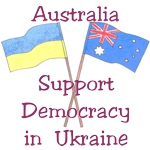 *** Updated information and templates – 12 Feb 2014 ***
*** Updated information and templates – 12 Feb 2014 ***
Community members have requested ‘template’ letters that they can reference / use when contacting their local Federal MPs to request greater action by Australia in support of Ukrainian democracy.
Attached are letter templates prepared by the Victorian Maidan Committee under the auspices of the Association of Ukrainians in Victoria (AUV) and the Australian Federation of Ukrainian Organisations (AFUO).
One letter is for use with Government (Liberal or Nationals) MPs and the other is for use with Opposition (Labor) MPs.
Letter to a Government MP:
Letter to an Opposition MP:
Details of your local MP can be obtained on the website of the Australian Parliament. http://www.aph.gov.au/
Contact your federal member by letter, phone, e-mail, in person……
Key messages which should be conveyed: Key messages for consideration
Summary of EuroMaidan
On 21st November 2013 President Viktor Yanukovych made an abrupt decision to abandon closer ties with the European Union, less than a week before he was due to sign an Association Agreement with the EU. This triggered spontaneous and massive anti-government and pro-Europe EuroMaidan demonstrations in Ukraine, initially in the capital Kyiv, and quickly spreading to other cities around Ukraine. These demonstrations were followed up with supporting rallies by Ukrainian communities around the world.
The demonstrations in Ukraine were met by brutal force from the Ukrainian riot police “Berkut”. On 30th November riot police detained dozens of anti-government protesters in a violent crackdown in Kyiv.
Yanukovych showed his true leanings in favour of Russia when, in a December meeting between Yanukovych and Russian President Putin, Russia offered a $15 billion bailout and a 33% discount on imported natural gas. In return Ukraine was to cooperate with Russia in a number of “joint ventures”.
MPs from the Party of Regions and their allies passed a series of anti-protest and anti-democratic laws via a “show of hands” on 16th January 2014. President Yanukovych approved these laws the following day.
These new “laws” not only further enraged the demonstrators who had maintained their EuroMaidan rallies since November, but also caused widespread condemnation from governments around the world.
The demonstrations turned deadly on 22nd January, when at least three protesters were killed (2 by gunshot) during a police assault on the crowd. More than 300 suffered injuries.
On 28th January 2014, after a series of meetings over the preceding days, the Ukrainian prime minister Mykola Azarov and the whole cabinet resigned. On the same day the anti-protest laws were repealed by an overwhelming vote in the Ukrainian parliament (“Verkhovna Rada”).
The Party of Regions passed a controversial and conditional amnesty law on 29th January 2014, requiring a number of prerequisites, which if not met, would cause the law to expire.
The protestors in Kyiv remained deeply suspicious and maintained their positions, demanding the resignation of Yanukovych and calling for new elections.
The Russian government, with its by now usual hypocrisy, denounced the interference of western governments in Ukrainian affairs, whilst simultaneously re-imposing trade restrictions by slowing down customs procedures, and indicating that the bail out “loan” may be put on hold.
On 30th January 2014 it was announced that Yanukovych was ill. This “illness” was treated with scepticism by the protestors, who considered it is an excuse by the president to delay signing off on the repeal of the anti-protest laws, and also to avoid public meetings aimed at resolving the crisis.
Yanukovych approved the repeal and amnesty laws on 31st January.
On 2nd February it was announced that Yanuvych would return to work on Monday 3rd February 2014.
Many members of the “resigned” cabinet remained in a ‘caretaker’ capacity.
Yanukovych made some half-hearted attempts at resolving the crisis. On the 7th February he visited Sochi, Russia, for two days, ostensibly for the opening of the Winter Olympic Games, but also included meetings with Putin. Putin further reiterated that the ‘loan’ was on hold, the reason quoted this time that all outstanding debts had first to be re-paid.
Protesters retained their presence. Members of the caretaker cabinet have acted provocatively, accusing the protesters of being terrorists, being the root cause of the national debt accumulated over the last three years, being the cause of the large devaluation of the hryvnia, etc. Whilst the Berkut-instigated violence on the streets of Kyiv has subsided, more details came to light of the hundreds of demonstrators arrested, and there are continuing reports of serious attack on demonstrators. Serious injuries have been reported by hundreds of demonstrators.
The EU and USA have raised the prospects of further actions against the ruling regime in Ukraine, including selective sanctions.
